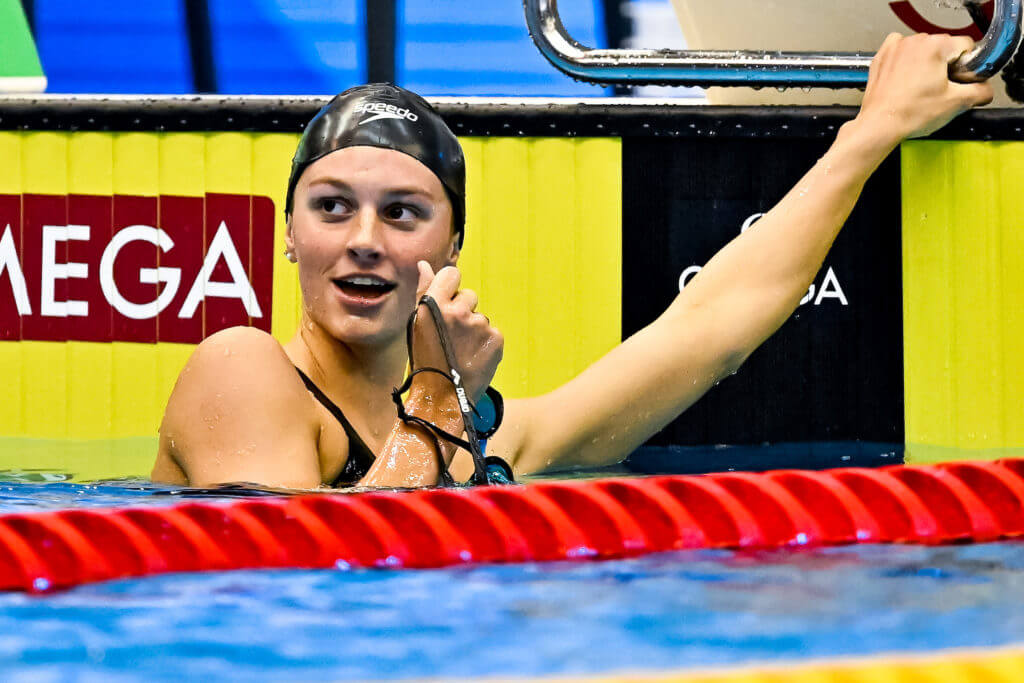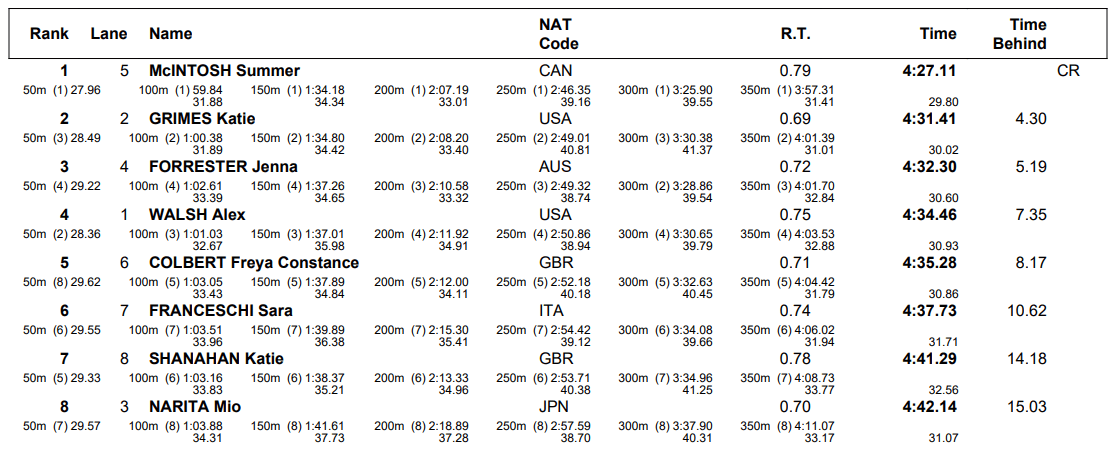World Championships, Day Eight Finals: Summer McIntosh Routs Field in 400 IM; Post No. 3 Time in History

Editorial content for the 2023 World Aquatics Championships is sponsored by FINIS, a longtime partner of Swimming World and leading innovator of suits, goggles and equipment.

World Championships, Day Eight Finals: Summer McIntosh Routs Field in 400 IM; Post No. 3 Time in History
The World Championships started with a bump for Summer McIntosh. They ended with a boom.
One week after the Canadian teenager missed the podium in the 400-meter freestyle, an event in which she entered as the world-record holder, McIntosh capped her trip to Fukuoka in stylish fashion. Behind a runaway performance that left her four seconds clear of runnerup Katie Grimes of the United States, McIntosh repeated as the world champion in the 400 individual medley.
The 16-year-old, who trains under Brent Arckey with the Sarasota Sharks, put her multi-event skills on display at the Marine Messe Hall. After qualifying for the final as the No. 2 seed, McIntosh took command from the opening butterfly leg and delighted the crowd with what was primarily a one-woman show.
McIntosh registered a time of 4:27.11, the third-fastest in history, and comfortably ahead of the 4:31.41 of Grimes. Only McIntosh’s world record of 4:25.87 and Katinka Hosszu’s winning time (4:26.36) from the 2016 Olympic Games in Rio de Janeiro are faster.
Sitting in third place at the 300-meter mark, Grimes used her freestyle strength to pull ahead of Australian Jenna Forrester down the stretch. Grimes’ time was not far off the longstanding American record of 4:31.12, set in 2008 by Katie Hoff. Forrester picked up the bronze medal in 4:32.30 while American Alex Walsh was fourth in 4:34.46.
“Going into tonight, I just wanted to see how hard I could push myself since the 400 individual medley is such a hard event,” McIntosh said. “I’m just learning more and more each time I swim. I think a lot of it comes back to my training. I try to be as consistent as possible in training because that’s what gets consistent results at meets like this.”
On the opening day of competition, McIntosh competed in what was dubbed The Race of the Century: Part II, a showdown in the 400 freestyle with rivals Ariarne Titmus and American Katie Ledecky. That much-hyped race morphed into a romp by Titmus, who set a world record and touched the wall more than three seconds ahead of Ledecky. McIntosh, meanwhile, missed the podium with a fourth-place effort, after being run down by New Zealand’s Erika Fairweather.
There were immediate concerns surrounding McIntosh, whose time in the 400 freestyle was more than three seconds slower than her previous world record. Was it one off race? Would her struggles extend into her other events? Would she bounce back? It didn’t take McIntosh long to provide an answer, proof that she was just fine coming in the 200 freestyle.
While Australian’s Mollie O’Callaghan and Titmus battled for supremacy in the four-lap discipline, McIntosh looked sharp en route to the bronze medal in 1:53.65, good for a world junior record. A night later, McIntosh added gold in the 200 butterfly, where she went 2:04.06 for another world junior standard.
Her best arrived last.
McIntosh is inarguably the most versatile female swimmer in the world, her medals at the World Champs arriving over three different disciplines. But beyond the freestyle, butterfly and medley, McIntosh is also potent in the backstroke. Put it all together and it’s not surprising the Canadian has put a chasm between herself and the opposition.
McIntosh now heads down the road to the 2024 Olympic Games in Paris with momentum, and a great deal learned. Certainly, she displayed resiliency in Fukuoka, a trait that will serve her well in the more-pressurized realm of the Olympics. She also figures to be motivated by what unfolded in the 400 freestyle, eager to return to 3:56 territory and go to a level that will enable her to challenge Titmus.



- MEET HOMEPAGE
- COMPETITION SCHEDULE
- ENTRY LISTS
- 2022 WORLD CHAMPIONSHIPS
- LIVE RESULTS
- DAY 1 PRELIMS RESULTS
- DAY 1 FINALS RESULTS
- DAY 2 PRELIMS RESULTS
- DAY 2 FINALS RESULTS
- DAY 3 PRELIMS RESULTS
- DAY 3 FINALS RESULTS
- DAY 4 PRELIMS RESULTS
- DAY 4 FINALS RESULTS
- DAY 5 PRELIMS RESULTS
- DAY 5 FINALS RESULTS
- DAY 6 PRELIMS RESULTS
- DAY 6 FINALS RESULTS
- DAY 7 PRELIMS RESULTS
- DAY 7 FINALS RESULTS
- DAY 8 PRELIMS RESULTS
- DAY 8 FINALS RESULTS



